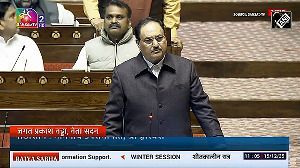Clearly the world's largest democracy has figured only occasionally on the White House itinerary for almost 60 years and much of this was due to the 'estranged' nature of the bilateral relationship.
However the Bush team which assumed office in January 2001 was determined to alter the framework of the troubled bilateral relationship in a definitive and positive manner. This intent was evidenced in the 'National Security Strategy of the USA' released in September 2002, which said: 'The United States has undertaken a transformation in its bilateral relationship with India based on a conviction that US interests require a strong relationship with India. We are the two largest democracies, committed to political freedom protected by representative government. India is moving toward greater economic freedom as well. We have a common interest in the free flow of commerce, including through the vital sea lanes of the Indian Ocean. Finally, we share an interest in fighting terrorism and in creating a strategically stable Asia.'
The enormity of 9/11 led to a predictable shift in US priorities, but it was only in March 2005 with Condoleezza Rice as the new Secretary of State that the 2002 intent acquired policy contours.
This ambitious scope of a more meaningful and 'engaged' bilateral relationship was reflected in the July 18, 2005 Bush-Manmohan Singh joint statement and the most striking feature was the US commitment to assist India in its civilian nuclear endeavour.
The symbolism of this shift in US nuclear policy was remarkable for it marked a radical contrast, in that, the nuclear factor that had been a nettle in the India-US relationship for 50 years was to become one of long term cooperation.
And by extension, India, which had been kept outside the loop of global nuclear commerce and high technology trade was to be admitted into the global comity -- subject to a separation of its nuclear facilities and the acceptance of certain safeguards under IAEA aegis. India's post-May 1998 nuclear weapon status was being tacitly accepted by the US though not in a de jure sense that the NPT recognizes.
'India's nuclear arsenal must be diversified'
As anticipated, some deeply entrenched constituencies on both sides remain either wary or deeply critical of the July 18 agreement and this is more palpable in the Indian context, where there appears to be considerable anxiety that the identification and separation of civil and non-civil nuclear facilities would somehow fetter India's strategic autonomy.
In recent days there has been speculation in India that the nuclear component of the July 18 agreement will remain a work in progress, mired in the stasis of contested negotiations. It is against this backdrop that Mr Bush will be visiting India and an analysis of what is really at stake is instructive.
The central feature of the July 18 agreement is not about India's nuclear weapons programme but the means by which the Indian civilian nuclear sector can benefit from being enabled to enter the loop of global nuclear commerce.
The US executive under Mr Bush stands committed to bringing about a change in US legislation -- in consultation with the US Congress which has the mandate to do so -- to lift sanctions and restrictions applicable to India, as also prevail upon the Nuclear Suppliers Group, or NSG, to extend similar provisions to India.
'N-deal ends nuclear isolation'
In short, Russia, France and other NSG member states would be allowed to provide nuclear material and technological assistance to India -- acts which are now prohibited.
Such a transformation in US law and related global nuclear regimes will mark a truly historic punctuation and the India-US relationship would be cemented in an abiding and mutually beneficial manner. This development would also enhance India's relevance in the global strategic canvas and facilitate its economic growth along the promising trajectory it aspires for.
The latter is linked inexorably to two determinants -- assured non hydro-carbon energy availability and admittance to the global high- tech network which also encompasses space research -- one of the more important but repeatedly ignored aspects of the July 18 agreement.
'Bhabha wanted India to be a Nuclear Weapons State'
Those critical or sceptical of the spirit of the nuclear component of the India-US relationship in both countries are indicative of an inflexible mindset that is not cognisant of the tectonic transmutation that the 21st century is now poised on.
The term 'strategic' that till recently was synonymous with the nuclear weapon is on the cusp of being reinterpreted. The world is moving inexorably to the post nuclear weapons age and while WMD insecurities will remain residual, the truly strategic determinants that will shape the destinies of states and civil society in the next few decades will be technology and the ability to adapt economies to the information -cum knowledge domain.
An objective assessment of the macro trends likely to characterise the 21st century irrefutably suggest that India and the USA represent a natural complementarity wherein the realisation of the July 18 pact will advance their respective national interests. The challenge to the political leadership on both sides will be to prevail and persuade their democratic polities to see the big picture and not be misled by imaginary exigencies and worst-case scenarios that are born out of misplaced timidity or visceral mistrust of each other.
Time to redeem or reject nuclear deal
Thus the Bush visit to Delhi represents a rare opportunity to forge a meaningful -- but till now elusive -- partnership between two asymmetrical democracies, that can positively impact the strategic architecture of the 21st century. While there is an inherent mutuality of interests at play, it must be acknowledged that India stands to benefit more in taking July 18 to its logical fruition.
Sacrificing this window of opportunity for more emotive considerations and misplaced notions about 'strategic' autonomy would also make a mockery of India's long standing commitment to minimum deterrence as a prelude to ultimate nuclear disarmament.
C Uday Bhaskar is one of India's leading strategic analysts





